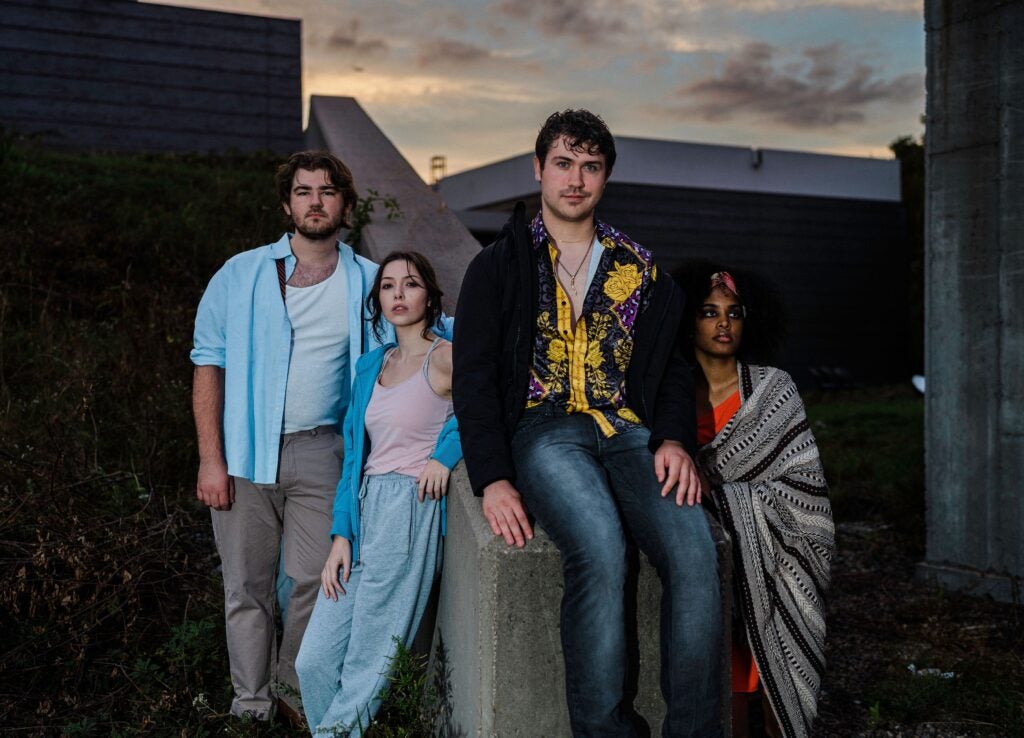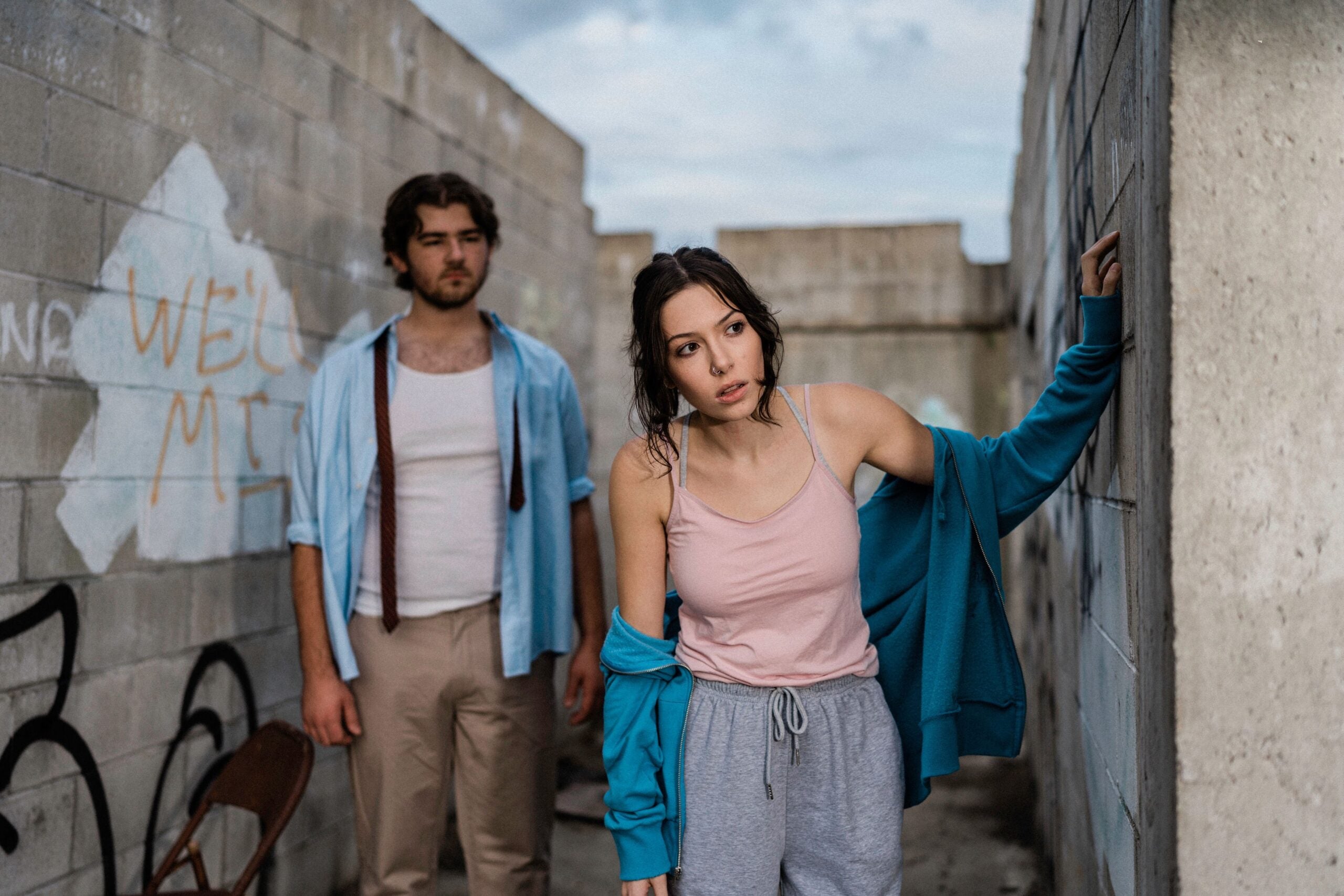KINGSTON, R.I. – Oct. 7, 2022 – I believe in nothing … You can’t trust nobody … Everybody’s running a scam … I’ve seen friends die.
On dead-end streets, and in an abandoned, rundown factory that serves as a temple to excess and despair, those are the realities of the homeless, preyed-upon youth of “Polaroid Stories,” which opens Thursday, Oct. 13, in the University of Rhode Island’s Robert E. Will Theatre.
Told in non-linear vignettes, Naomi Iizuka’s 1997 play provides a gritty, troubling view of life on the streets – a world of drug addicts, dealers, prostitutes, and runaways trying to survive in this no-man’s lands on the fringes of an unidentified city. Based in part of Ovid’s epic poem, “Metamorphoses,” the play blends Greek mythology – including characters such as Zeus, Dionysus, Orpheus, Eurydice – with true stories of homeless youth.

“At the heart of it, ‘Polaroid Stories’ is a story that is really about both the desire and consequences of escape,” said director Patrick Saunders, an adjunct professor of theatre at URI. “The characters are trying to escape from really terrible situations, but the avenues they use for that escape are equally as destructive. They really don’t want to feel their pain and they don’t want to have to be themselves anymore. This is our opportunity to understand what those drives feel like, how easy it is to get trapped in a situation like the ones we see on the stage, and to really empathize with and recognize that those are desires that all of us have.”
Saunders, who acted in a production of “Polaroid Stories” with Burbage Theatre in Pawtucket in 2019, says the mashup of mythology and the real stories Iizuka mined from interviews with homeless youth helps to elevate the characters, making it harder for audiences to dismiss them.
“I think the reason Iizuka casts these characters, who are otherwise the disenfranchised, as gods and as mythical beings is to force us to see them without reducing them to some archetypal addict,” he said. “That can be a danger of this play. If you weren’t encouraged to look through this other lens, it could be easy to think they’re in these positions purely because of substance abuse.”
“Polaroid Stories,” which runs an energy-fueled two hours, going nonstop through about three-dozen, interwoven vignettes, was a popular choice among students when the URI Theatre Department selected its season.
“I think many students were excited because this play is different from the other shows we’ve done in recent years,” said Courtney Satterley ’23. “We also really wanted the challenge of a more contemporary text. The message of ‘Polaroid Stories’ is also more timely now than ever. Despite taking place during the ‘war on drugs’ and the rise of homeless youth in the ’90s, the problems during that era continue with us today.”
Satterley plays Skinhead Girl, who, along with Skinhead Boy, serve as direct links to the homeless youth Iizuka interviewed for the play. The play’s eight other characters are taken from mythology, imbued with the hardships of the modern streets. “I love the newfangled use of Ovid’s ‘Metamorphoses’ to tell these tragic and important stories,” she said.
Liam Roberts ’24 plays D (Dionysus), the Greek god of wine and pleasure, and fittingly the life of the party and ruler of the kingdom in “Polaroid Stories.” “He is the embodiment of care-free energetic, vice-fueled freedom,” Roberts said. “He loves to share his vice with those around him to see if they can keep up with his manner of living.”
“I love the play because of its poetically profane nature that is not afraid to challenge the audience’s way of thinking and at times punches the audience in the gut with the sobering dark realities that the play presents,” he added.
Jenna Muldoon ’23 plays Echo, a gossip who was cursed by the goddess Hera to only repeat the last words of others. As in mythology, she’s in love with the self-centered Narcissus, a prostitute looking for a sugar daddy when he’s not looking in the mirror. For much of the play, she follows him as he talks about himself, only able to parrot his words in reply.
Acting with that limitation was a learning experience. “In the beginning I had a really hard time, but eventually it became a really cool tool because in theatre we only say aloud what we need to say,” she said. “Only having these words isn’t so much an inhibition as I had expected it to be because, as we all know, ‘it’s not what you say, it’s how you say it.’”
Bringing the hardscrabble world of “Polaroid Stories” to life has also been the work of numerous designers – some alumni and current students – and more than 35 student production workers.
The set, designed by Assistant Professor James Horban, is a three-level labyrinth that resembles a discarded factory that mixes classical elements with a contemporary feel. “A modern version of a temple in ruins,” Saunders said. Costumes, designed by Matt Oxley ’21 of South Kingstown, are mostly contemporary clothing that represent the different avenues people take to this dark world.
The play’s atmosphere is echoed in the lighting, said lighting designer Audrey Visscher ’22. “This show plays heavily into using drugs and partying as a means of escape,” she said. “I want to create an environment where the audience feels like they are going on this trip with the characters.”
The work of props master Melie Hayes ’23 of Charlestown also brings that home. Hayes has worked on 36 items for the play, many of which have duplicates because of the play’s depiction of drug use. “My friends affectionately refer to me as ‘drug illiterate’ because I know so little about them,” she said. “But for this show, I had to do a fair amount of digging into the basics to make safe and visually accurate alternatives for the stage.”
Pardon our appearance
The Fine Arts Center, home of the Will Theatre, is undergoing construction work, so patrons should use the theatre entrance in the back of the building, accessed from the parking lot on Bills Road. Look for the entrance marked with the large banner “Welcome to URI Theatre,” as well as signs leading to the lobby doors.
“Polaroid Stories” runs Oct. 13-15 and Oct. 20-22 at 7:30 p.m. and Oct. 16 and 23 at 2 p.m. in Will Theatre at the Fine Arts Center, 105 Upper College Road, Kingston Campus. Tickets are $20 for general admission and $15 for senior citizens and URI students, faculty and staff. Tickets can be purchased online, or in the Fine Arts Center in Room 101H (across from Will Theatre), or by calling (401) 874-5843. For more information on tickets and the University’s COVID-19 policy, go to the ticket website.
“Polaroid Stories” cast:
Character, Actor, Hometown
D (Dionysus), Liam Roberts, Warwick
Eurydice, Syd Davey, Sturbridge, Massachusetts
Persephone (also Semele), Ayrin Ramirez, Providence
Orpheus (also Tereus), David Weber, Sault Ste. Marie, Michigan
Philomel, Ashlyn Banno, Johnston
Skinhead Girl, Courtney Satterley, Portsmouth
Narcissus, Justin Peters, West Orange, New Jersey
Echo, Jenna Muldoon, Staten Island, New York
Skinhead Boy, Henry O’Brien, South Kingstown
G (a.k.a. Zeus, Hades), Ben Pereira, Danbury, Connecticut
Understudies
D (Dionysus), David Santana, Providence
Eurydice, Giulia Russo, Caldwell, New Jersey
Persephone (also Semele), Liliana Varela, Pawtucket
Orpheus (also Tereus), Brandon Tallardy, Westerly
Philomel, Chayla Valentine, Woonsocket
Skinhead Girl, Emma Freel, Barrington
Narcissus, Christian Owen, Eastport, New York
Echo, Paige D’Iorio, Haverhill, Massachusetts
Skinhead Boy, Matt Perrotta, Cranston
G (a.k.a. Zeus, Hades), Alex Linn, Hanover, Massachusetts

